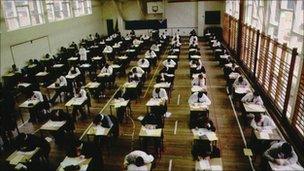4 in 10 pupils below reading age in Wales
- Published

Estyn wants teachers to work harder to boost key skills like literacy and numeracy among pupils
Four in 10 pupils in Wales have reading skills below their age, leading to a call to schools to concentrate on literacy and numeracy.
Schools inspection body Estyn's six-year study found performance in nearly a third of schools was not good enough.
The chief inspector, Ann Keane, said Estyn wanted to see teachers work harder to boost key skills.
The assembly government said it showed "progress in most areas," and the NASUWT said standards were improving.
Mrs Keane told BBC Radio Wales: "The issue is not that literacy and numeracy is the province just of maths, English or Welsh lessons, but that it should be the basis for how teachers teach all subjects in the curriculum.
Lower reading age
"These are the areas that we would like teachers to work harder at and these are the areas that we would like to see the professional learning communities of teachers discussing how to improve.
"We are still in the situation... that when pupils transfer from primary to secondary, around 40% of them have a reading age that is lower than their actual age, standards of writing are not good enough at any key stage, boys are doing less well than girls and in adult education, standards of basic education could be improved on by increasing that provision."
Estyn's report , externalon every school and education provider over six years found improvement in schools was "slow" and that just 8% of schools achieved the top grade across all aspects of inspection.
But it said there were significant improvements in further education, in work-based learning and early-years provision.
NASUWT secretary Geraint Davies said there was lots to celebrate in the report.
He said: "In the last six to nine years we have seen tremendous progress.
"In terms of the current report, the chief inspector said schools in Wales have either stood still or have improved.
"It's all too easy to concentrate on the negative but... we are moving in the right direction."
'Terrific strain'
Last month, the publication of the Programme for International Student Assessment (Pisa) suggested children in Wales were lagging far behind the rest of the UK and much of the world.
But Mr Davies said the assessments, were "just a snapshot" and not representative of every school in Wales.
He also argued that teachers were already under "terrific strain" from the number of assessments imposed on them.
His view that progress was being made was shared by David Egan, professor at the Cardiff School of Education at Uwic.
"We need to celebrate that and congratulate students, parents, teachers and schools," said Prof Egan.
"But it's not enough, we do need more progress, particularly in relation to the evidence from Pisa and in relation to skills, literacy and numeracy."
Conservative education spokesman Paul Davies said the report delivered a "damning verdict" on standards in Welsh schools "in spite of the best efforts" of teachers.
"We need a fresh approach giving schools control over their funding and empowering teachers, parents and governors to make more decisions because they know better than politicians what is best for their local school," said the Tory AM.
Liberal Democrat AM Jenny Randerson said the Estyn report showed that pupils were being left behind in terms of reading, writing, maths and science.
She said: "It is clear from report after report on education that Labour/Plaid have failed the children of Wales.
"Serious action is required soon or Wales will be left even further behind."
Nerys Evans for Plaid said it was time for a "radical transformation" in the Welsh education system.
She said: "A quality, fit-for-purpose education system is vital for the future of our nation and for Plaid Cymru there are no areas that we are not willing to look at in order to improve standards."
First Minister Carwyn Jones was asked about the report at question time in the Senedd.
He denied a claim by Welsh Liberal Democrat leader Kirsty Williams that he was "complacent" about the findings.
He said Education Minister Leighton Andrews would set out his views on the way forward in a forthcoming speech.
"It's useful for us to have the Estyn report because it shows that 70% of schools are performing and 30% are not," the first minister said.
"It does show that there is work yet to be done in many schools to ensure that the level of quality leadership that is prevalent in some schools is actually available to all schools in Wales."
Mrs Williams said: "With all due respect... a keynote speech from your education minister some time in the future is hardly the credible response to the contents of the report that has been published."